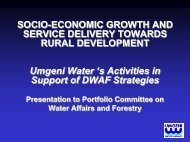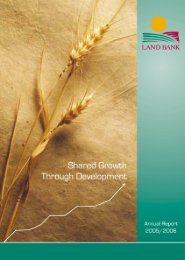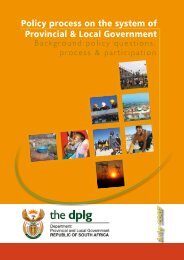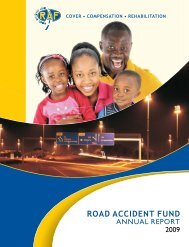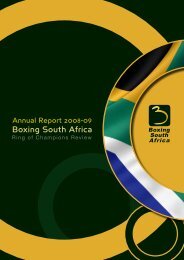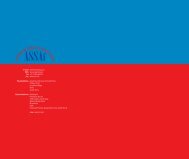3. PPECB Annual Report 2009-2010
3. PPECB Annual Report 2009-2010
3. PPECB Annual Report 2009-2010
You also want an ePaper? Increase the reach of your titles
YUMPU automatically turns print PDFs into web optimized ePapers that Google loves.
the monitoring of product temperatures and overseeingstowage conditions in all modes and the supplying of exportdata according to predetermined requirements. Theserequirements were designed to conform to both Board’sand accepted international standards and meeting localconditions during storage and shipments.Container loading supervision over vast distances, as part ofthe so called door-to-door concepts, where <strong>PPECB</strong> had toensure that all criteria was met. This also includes the verystrict special shipment container programmes in and aroundport areas to 17 different sterile destinations.Reefer Vessel loading supervision in all ports included Maputo,where Cold Chain services ensured that inspected productswere loaded according to strict guidelines into correctlyallocated decks. This also includes the highly specialisedshipments to Japan and the USA, whereby <strong>PPECB</strong> participatedand contributed to the successful arrivals to these verystringent destinations.Container inspections executed at all 23 depots nationallyresulted in 148 139 containers inspected with a rejectionrate of 7,51%.A total of 487 cold stores were inspected in all <strong>PPECB</strong> regionsof which 3,9% did not conform to the standards andrequirements as published. <strong>PPECB</strong> also surveyed 188 vesselsbefore the loading of South African perishable products. Ofthese vessels surveyed a notable 11,2% were found to beunsuitable to carry SA perishable products. All activitiessuccessfully mitigated risks in the supply chain for our clients,shipping lines, cold store operators and South African fruitin general.For the duration of the <strong>2009</strong> season a total of 88 276containers were exported on 1 858 vessels with 1,4%unsuitable containers identified prior to loading and 0,68%identified and rejected while in Transnet Terminal stacks.The supervision of specialised Reefer Vessels loading tookplace in all 4 ports. A total of 365 119 pallets were exportedon 201 shipments.During the period under review a total of 2 577 manifestswere audited which equates to 88 812 containers. Werecorded an 8,7% rejection rate emanating from erroneousdocumentation in this regard. This includes the checks andaudits prior sailing in all Ports of all reefer manifests forvarious container shipments.The auditing of temperature and ventilation settings of80 951 containers on 1 035 en-route vessels from the CapeTown port office for predetermined products resulted incorrective actions on 822 containers.All activities successfully mitigated risks in the supply chainfor our clients, shipping lines, cold store operators and SouthAfrican fruit in general.Programme: Food SafetyFood Safety is, and will remain, a critical aspect of perishableproducts intended for export and will remain a top prioritywithin <strong>PPECB</strong>. Continuous collaboration with the Departmentof Agriculture, Forestry and Fisheries (DAFF), the industryand <strong>PPECB</strong> exists to enhance the current South Africansystem ensuring its compliance to international and nationallegislation. The Official Food Safety Standard is continuouslyreviewed to ensure that changes and adaptations triggeredby the audits are incorporated into the standard.For the year under review <strong>PPECB</strong> remained vigilant in itsapplication of the Official Food Safety Standards by conducting261 new audits and 116 surveillance audits. All FBO’sremained committed to the standard by clearing out findingsin the allocated time, thus no FBO’s where prohibited fromexporting their produce. The decline in surveillance auditsis conducive to an ever changing environment. During<strong>2009</strong>/10 Fiscal Year we experienced those food businessoperators that were in compliance with the official foodsafety system opted for a commercial certification, as thisopened more markets for them to service. In contrast, thedecline can also attributed to an unsteady economicenvironment forcing food business operators not to export.<strong>PPECB</strong> remains active in awareness creation regarding foodsafety within the industry by means of published articles inmagazines, on the internet as well as radio talks. Buildingstrong partnerships within the industry ensures that the issueregarding food safety does not become dormant and thatit remains a top priority within the agricultural sector.Programme: CitrusWhile the 2007 and 2008 citrus seasons proved to be recordbreaking seasons the <strong>2009</strong> season saw a drop in exportvolumes which can be attributed to a number of reasonsbut difficult marketing conditions in especially Europe andthe strengthening of the Rand were the main contributors.As if the application of the normal Citrus Black Spot (CBS)strike system was not complicated enough, <strong>PPECB</strong> inspectorsalso had to deal with a new CBS risk management systemaimed at the European markets. The new system was rolledout in August <strong>2009</strong> after the Valencia season had alreadycommenced and our staff as well as the HarmonizationProgramme should be congratulated for the manner in whichthey responded to the challenge. One aspect that will continue48<strong>PPECB</strong> | annual report | <strong>2009</strong> - <strong>2010</strong>


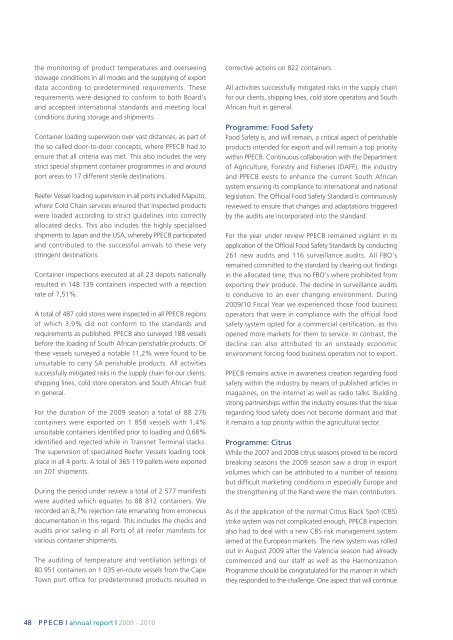

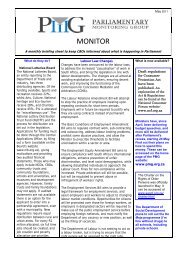
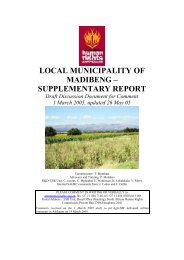

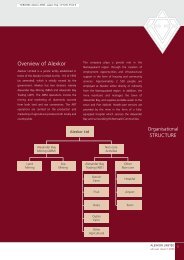
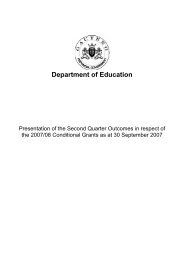
![National Research Foundation Annual Report 2008 / 2009 [Part 2]](https://img.yumpu.com/49774036/1/177x260/national-research-foundation-annual-report-2008-2009-part-2.jpg?quality=85)
